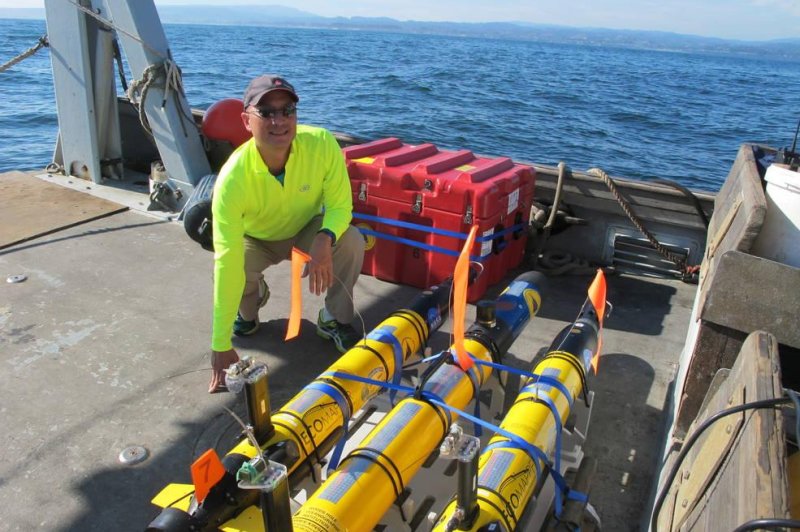NASA scientist Steve Chien poses with three underwater drones on Monterey Bay. Photo by NASA/JPL/Caltech
PASADENA, Calif., Dec. 1 (UPI) -- Scientists from NASA's Jet Propulsion Laboratory are working to improve submersible technologies by bolstering the artificial intelligence that helps underwater robots execute scientific missions.
Submersibles are now mostly preprogrammed. Without the ability to make decisions on the fly, their adaptability and scientific abilities are limited.
NASA scientists -- in cooperation with researchers from Caltech, the Monterey Bay Aquarium Research Institute, Woods Hole Oceanographic Institute and Remote Sensing Solutions -- are developing deep learning software for submersibles. Researchers are currently testing early iterations of their intelligence using a fleet of underwater drones in the Monterey Bay.
As of now, the drones, which are programmed to seek out temperature and salinity shifts, use forecasts delivered via satellite to plot their routes. Their artificial intelligence allows them to observe ocean changes in real time. Scientists aim to integrate the two types of information -- to marry real-time analysis with long-term planning.
Right now, engineers are never that far away from their submersibles. But NASA and other space agencies hope to one day use underwater drones to explore oceans on other planets and moons.
"In order to study unpredictable ocean phenomena, we need to develop submersibles that can navigate and make decisions on their own, and in real-time," researcher Steve Chien, head of the Artificial Intelligence Group at JPL, said in a news release. "Doing so would help us understand our own oceans -- and maybe those on other planets."
While visits to Europa may be far off, oceanographers and marine biologists are keen on the benefits intelligent submersibles can offer right now. Tracking the complex combination of ever-shifting factors that influence something as seemingly simple as bloom of plankton -- from nutrient density to ocean currents -- is nearly impossible without some semblance of artificial intelligence.
Better brains won't just help robots better track the complexities of food webs and "biocommunities," but also leave scientists more time to conduct science instead of managing a machine.
"Our goal is to remove the human effort from the day-to-day piloting of these robots and focus that time on analyzing the data collected," said Andrew Thompson, assistant professor of environmental science and engineering at Caltech. "We want to give these submersibles the freedom and ability to collect useful information without putting a hand in to correct them."















